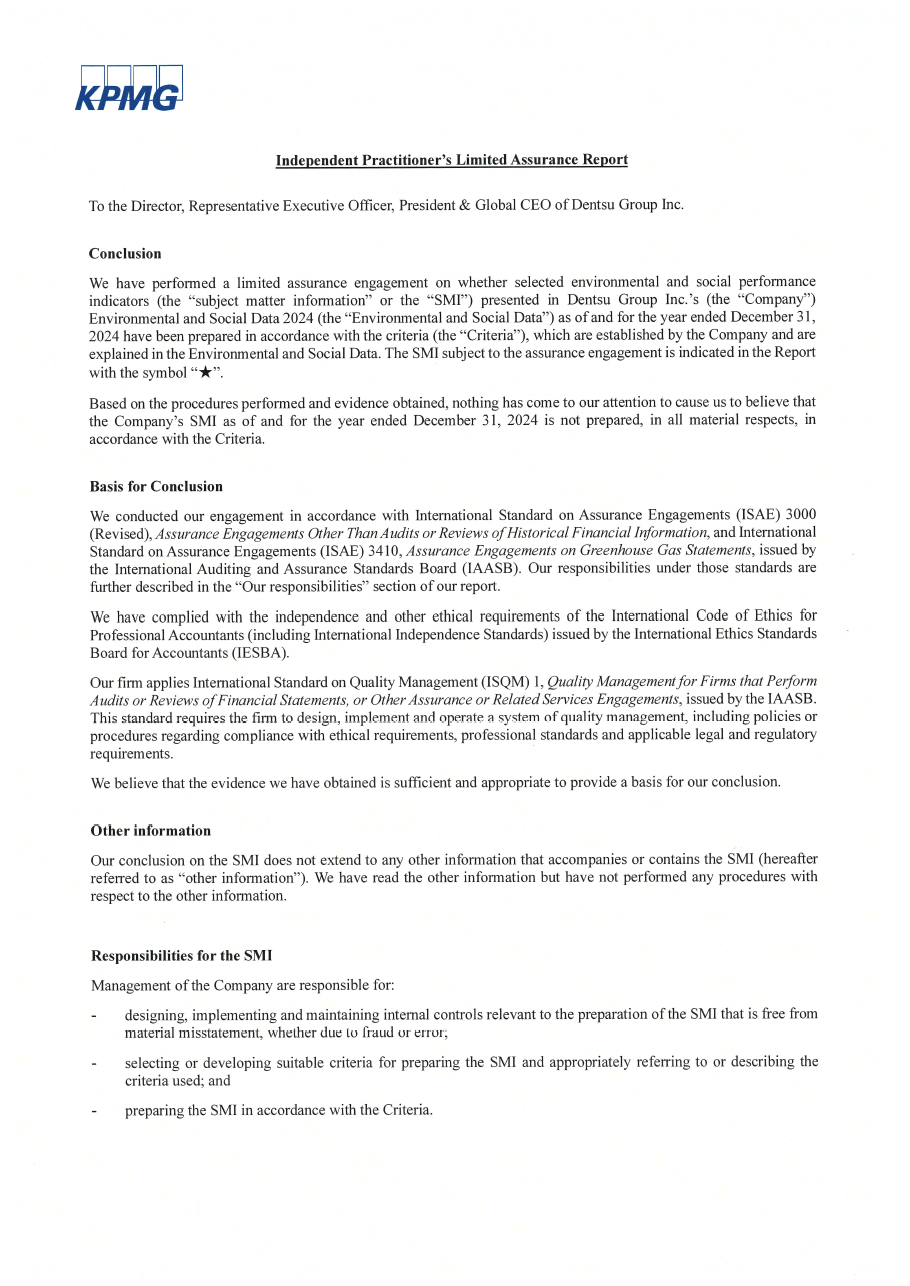Environment
Our science-based net-zero targets
We aim to drive sustainable growth for dentsu, our clients, and society. For this growth to be truly sustainable, we must accelerate the transition to a low-carbon future to mitigate the impacts of climate change. Dentsu has therefore committed to achieve net-zero greenhouse gas (GHG) emissions across the value chain by 2040.
To achieve net zero by 2040, we will prioritize emissions reduction activities before neutralizing the remaining emissions (<10%) through credible and verifiable GHG removal projects.
Our near- and long-term science-based GHG emissions reduction targets have been validated by the Science Based Targets initiative (SBTi) as conforming with the SBTi Corporate Net Zero Standard.

A key focus of dentsu’s approach to sustainability is the management of environmental risks. We will continue to comply with environmental and other applicable laws and legal reporting and disclosure obligations.
Our science-based net-zero targets for climate:
| Scope 1 & 2 | Scope 3 | |
|---|---|---|
| Near-term (2030) |
Reduce absolute Scope 1 & 2 GHG emissions by 46.2% by 2030 from a 2019 baseline* | Reduce absolute Scope 3 GHG emissions from purchased goods and services, business travel, and employee commuting by 46.2% by 2030 from a 2019 baseline* |
| Long-term (2040) |
Reduce absolute Scope 1 & 2 GHG emissions by 90% by 2040 from a 2019 baseline* | Reduce absolute Scope 3 GHG emissions by 90% by 2040 from a 2019 baseline* |
* The target boundary includes land-related emissions and removals from bioenergy feedstocks.
To ensure compliance with international best practice, we align our internal measurement and reporting processes with the guidelines set forth by the World Resources Institute (WRI) by using the GHG Protocol Corporate Accounting and Reporting Standard (revised version).
For our baseline year of 2019, Scope 3 emissions amounted to approximately 94% of our total GHG emissions.
Our near-term Scope 3 GHG emissions reduction target for 2030 focuses on our top three emission categories. This scope surpasses the SBTi requirement of two thirds of total Scope 3 emissions.
For more information on our latest performance and a list of emissions factors, please see our Independent Assurance Report below.
For details on our pathway to achieve our science-based targets, please refer to our Net-zero Transition Plan below.
Achieving 100% renewable energy by 2030
As part of our commitment to the environment, dentsu aims to achieve 100% renewable energy by 2030.
Renewable energy in the context of dentsu’s value creation strategy and commitments refers to electricity generated from renewable sources. This definition for renewable energy has been aligned with RE100, the global corporate renewable energy initiative of which dentsu is a member.
For more information on our latest performance, please refer to our Integrated Report.
Since April 2024, dentsu has been an Associate Member of the Japan Climate Leaders’ Partnership (JCLP), a group of Japanese companies that aim to lead the transition to a decarbonized society. JCLP is the local partner of The Climate Group and acts as the contact point for promotion in Japan of RE100 and other climate-related initiatives.

Environmental Policy
The Dentsu Group Environmental Policy outlines our efforts to mitigate the environmental impact that climate change poses, such as physical risks to assets and supply chains, and transition risks from regulatory changes to our business operations. These are underpinned by our strong commitment to compliance with environmental laws and regulations in our operations worldwide. By doing so, the Environmental Policy directly supports dentsu’s overarching business purpose of creating new solutions and sustainable growth for our clients and society.
Maintaining a robust environmental policy enhances dentsu’s ability to withstand and adapt to climate-related disruptions, ensuring operational continuity, as well as to respond to changes in our regulatory environment and stakeholder expectations.
Climate-related Disclosures
In 2025, we prepared for the first time our Climate-related Disclosures while applying the IFRS Sustainability Disclosure Standards as issued by the International Sustainability Standards Board (ISSB). This builds on previous reports that provided Group-wide information disclosures in line with the recommendations of the Task Force on Climate-Related Financial Disclosures (TCFD).
Net-zero Transition Plan
We recognize that climate-related risks pose a material threat to long-term business viability. In response, we are committed to proactively identifying, managing, and mitigating these risks through our Net-zero Transition Plan, enhancing our organizational resilience and safeguarding future value creation. This is part of dentsu’s approach to embedding climate-related risks, opportunities, and resilience into our business strategy.
Climate risk considerations are fully integrated into our strategic planning, capital allocation, and enterprise risk management frameworks. This alignment strengthens our ability to navigate an increasingly dynamic regulatory and market environment, while reinforcing our commitment to responsible, climate-aligned growth. We regularly review and refine our emissions reduction targets to reflect shifts in climate policy, advances in low-carbon technologies, and emerging decarbonization opportunities across our sector. This adaptive, forward-looking approach ensures that our climate strategy remains effective, science-aligned, and relevant to the global journey toward a low-carbon economy.


